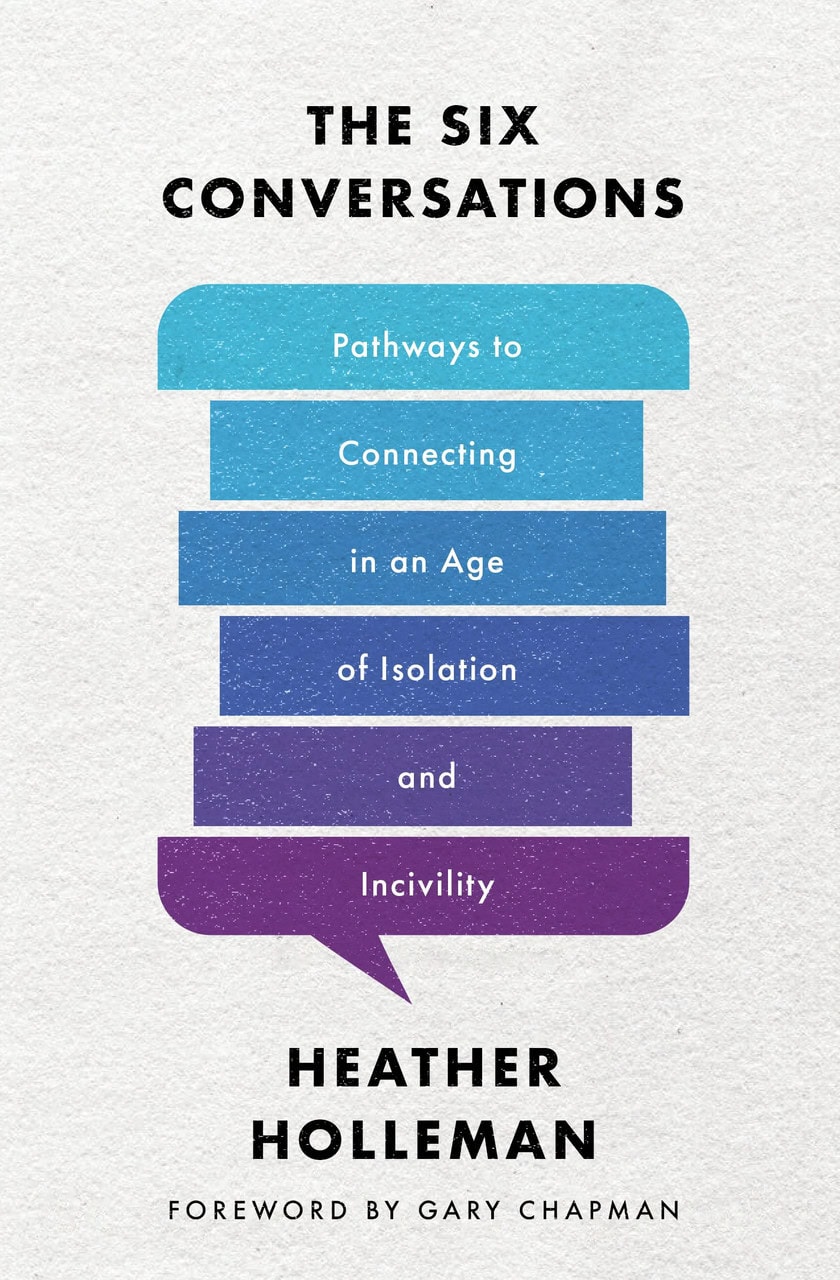Dr. Heather Holleman: It’s really a challenge. I mean, it’s a whole counter cultural way of living. I mean, someone told me once, “Heather, people are not the enemy, Satan is actually the enemy.” So when you’re with people, like elevate your thinking to be like, “I’m not battling you. We’re actually battling the Kingdom of the Heir (laughs), who is at work, and those who are disobedient, Ephesians 2, which is my other favorite passage of scripture.
John Fuller: Dr. Heather Holleman joins us today on this Best of 2024 episode of Focus on the Family with Jim Daly. Thank you for joining us, I’m John Fuller.
Jim Daly: John, we get a lot of response here at Focus, uh, around communication.
John: Mm-hmm.
Jim: You know, when you look at the bottom line of a lot of marital conflict, it comes down to poor communication. Sometimes we do it on purpose, pushing each others’ buttons and-
John: No, you do that?
Jim: (laughs) Yeah.
John: I do that.
Jim: I, I gotta confess that Jean will say, “You’re very good at that.”
John: Oh.
Jim: (Laughs) But it, these things we do and, uh, it can be communication with a friend, not just a spouse, or family members, your children, and there is so much we need to learn from scripture. In Colossians 4:6, Paul writes, “Let your speech always be gracious, seasoned with salt so that you may know how you ought to answer each person.” Isn’t that great?
John: That is a wonderful reminder.
Jim: I don’t think we always are mindful of that, especially in certain cultural contexts, or social media context.
Heather: Mm-hmm.
Jim: It seems like that guidance from the Lord goes out the window.
John: Mm-hmm. Yeah.
Jim: Lord, you don’t know the battle I’m in. Today, we want to help you, to equip you really, how to think about those things when it comes to communication. We have a great guest to help us along the way.
John: Yeah. Dr. Heather Holleman has studied relationships and communication. She’s an associate teaching professor of advanced writing at Penn State. She’s a speaker, an author, a coach. Her book that forms the foundation of our show today is The Six Conversations: Pathways to Connecting in an Age of Isolation and Incivility. And you can learn more about the book at our website, that’s focusonthefamily.com/broadcast.
Jim: Dr. Heather, welcome. (Laughs)
Heather: I’m so excited to be on this program. I’m really looking forward to this conversation.
Jim: Well, you know what’s fun is t- … When I’m hosting a program, I’m sure you think of this, John, I’m excited about learning something today-
John: Mm-hmm.
Jim: And I know I will because of what you’ve written in the book, I’ve done the prep, read the book, it’s just a terrific idea. Let me start there. You’re a professor at Penn State, so you’re interacting with young people all the time, these college students.
Heather: Yes.
Jim: Probably 18 to 24ish, and you ask them a question at the beginning of the semester in class. What is that question you ask and why do you ask it?
Heather: Well, I love to ask my question, um, what is the single most determining factor of a happy life?
Jim: Wow.
Heather: Because-
Jim: That’s crazy-
Heather: Yes.
Jim: That’s a big question.
Heather: Well, I became really interested in the Harvard Grant Study, which is the longest research study ever conducted, and it’s trying to answer the question what really makes people happy? What is kind of the foundation of wellbeing? And so I love presenting that research to my students to try to answer that question.
Jim: And what do they say?
Heather: Well, all the time they’re like, you know, “I don’t really know. What is it?” You know, when we, we brainstorm, is it wealth, is it, you know, fame, is it having a successful career? But the research shows that the number one determining factor of a happy life is warm connections. We were made-
Jim: Oh, just like how God engineered us.
Heather: Yes, (Laughs), exactly how God made us.
Jim: (Laughs)
Heather: And, um, I’ll never forget the day I asked that question and I gave the students the answer and a student said to me, “Dr. H., how do we get those?”
Jim: Yeah.
Heather: “How do we get those warm connections?” So I’m someone passionate about solving the loneliness epidemic problem and just looking at the health outcomes of what happens when you’re lonely and you’re missing warm connections. As we’ve learned from our Surgeon General Report that came out on the epidemic of loneliness.
Jim: Oh, that’s right. Uh, let me, before we go there-
Heather: Uh huh.
Jim: Because I want to go a little deeper on that topic of loneliness, but you know, some Christians, when we hear that word happiness, it, we’re not talking about the, kind of the superficial happiness, this is core joy. This is where we find deep happiness.
Heather: Yes. Yes.
Jim: So I didn’t want people to get tripped up spiritually on-
Heather: Right.
Jim: “Hey, we’re always talking about being happy.” That’s not what we’re talking about.
Heather: No, and Jim, that’s what most delighted me about all this social science research that I had to, you know, kind of this meta analysis, look through all the research. It really lines up to what the Bible has already told us. (Laughs)
Jim: You’re kidding.
Heather: You know, thousands of years ago.
Jim: (Laughs)
Heather: Really, the mindsets that you need for a warm connection, and really what it means to be thriving as a person has already been outlined in scripture, and it’s like the social sciences are… is just now catching up to what we’ve already been told about how to live a really abundant life in Christ.
Jim: You know, so much of this spiritual battle, um, when we look at spiritual warfare, when you look at what the enemy is trying to do to-
Heather: Yes.
Jim: …disconnect, to divide, to separate…
Heather: Yeah.
Jim: I mean, those are kind of the qualities that he possesses. And then the Lord, that togetherness, that community, that relationship, we have to think about that, and we don’t want to fall prey to the simplicity of the cultural soul of giving in to those, uh-
Heather: No, that’s right.
Jim: …horrible directions.
Heather: Right, and how pleased the Holy Spirit is with unity, that spirit of unity.
Jim: Mm-hmm.
Heather: And if you look at Galatians 5, I’m amazed at how so much of the fruit of the flesh is about division, about things you do that will divide people. It’s deeply convicting when you read Galatians 5 or Romans 12…
Jim: It is.
Heather: Or Philippians 2, I’m thinking to myself, “I am not living this way.” I’m in a culture that’s not living this way, and I have to teach my students a new way to live.
Jim: Yeah, it’s so good. Now, going to that loneliness, uh-
Heather: Yes.
Jim: …measurement, you know, right now they’re saying loneliness is the deepest, the highest, however you want to say it, it’s ever been. So here’s a world we’re well-connected in, with smartphones, and we’re moving fast, but we’re texting constantly, it feels like, so we’re connected but we’re not happy.
Heather: Right.
Jim: We’re not joyful, we’re more lonely, or we’re lonelier than we’ve ever been.
Heather: That’s right.
Jim: Why that contradiction? Why does texting connections not fulfill that hole for us?
Heather: Well, I think you’re not getting the warm connection that the research shows happens through these mindsets that you have, of being curious, of believing the best about people, expressing concern and sharing your life. Some of that can happen through, you know, through virtual means, but we’re not seeing just those conversations that you need to have that are the foundation of like interpersonal connection. So when I read the Cigna Health Study of 20,000 US adults. This was 2018, so imagine how bad it is now. Over half the population is saying that they always feel alone, or that during the week they are not having even one meaningful conversation with someone.
Jim: Well-
Heather: Which I, I see that in my college students.
Jim: Well, I was going to say, that’s that comment that you got from the student-
Heather: Yes.
Jim: “How do I find that kind of relationship?”
Heather: Yes.
Jim: You look at culture today, the incivility that exists-
Heather: Yes.
Jim: I even express it to my colleagues here at Focus and to my wife at home. It’s like a, a can of ugly has been cracked open.
Heather: Yes. Yes.
Jim: From a spiritual standpoint. You know, we used to be polite toward each other, generally. There was kind of that Judeo-Christian ethos in the country.
Heather: Mm-hmm.
Jim: I can remember that, and a lot of people will say that’s because you’re 60. (Laughs). But the point is, there used to be a time when, although we may disagree, it, it didn’t feel as deep, as cutting, as visceral as mean-spirited as it is today, especially on social media, where it seems like people feel an anonymity to saying, “I totally disagree with you and I hate your guts.”
Heather: Yeah. I see it at-
Jim: I mean, what, what is going on?
Heather: Well, one thing I learned, um, from my students and colleagues is what happens when you meet someone for the first time. I asked my students, you know, “What’s going through your mind when you meet someone?”
Jim: Mm.
Heather: And they say, “Well, I want to know who did you vote for, what did you believe about vaccines, what was your position on Roe v. Wade.” So they’re like vetting each other with suspicion and judgment. And I said, “Well, imagine if you decided to believe the best about that person, and learn how to ask really good questions to figure out that person’s core values, where you can really find common ground.” So it, it’s a whole different way of thinking-
John: That’s a wonderful way. Yeah.
Heather: And it really is living out Romans 12, you know, blessing those, outdoing one another in showing honor, and Philippians 2, you know, honoring others above yourself and believing that you can really learn from everyone is going to change how you interact with anyone you meet.
Jim: I’m telling you, some people right now, they’re going, “Are you serious, Heather?”
Heather: Oh, I’ve gotten, yeah.
Jim: What am I going to learn from my neighbor, who doesn’t agree with me on anything?
Heather: Oh, well, let me tell you. I’ll tell you a question right now, because you guys care about practical, you know, immediate practical skills, what if instead of judging your neighbor for the political sign they have in their yard or they disagree on social issues, what I’ve had to say to my neighbors is, “I can tell you care really deeply about this issue, I would love to know the story of when you first started caring about this.”
Jim: Oh, wow.
Heather: Suddenly you’re out of the realm of argument and you’re in the realm of warm connection, which is… people are more likely to change their mind about things if they feel connected. So my husband and I, and my husband, who’s an introvert by his own admission, doesn’t… you know, he would be nervous having these conversations. We’ve just had great success just asking people, “Tell us the story of when you first started to care about this.”
Jim: And I think in that context, the way God has wired us to the research that you’re noting-
Heather: Yes.
Jim: There is something about our, our spiritual DNA, when a, when you feel somebody cares about you, it’s like it cracks that crusty heart open.
Heather: That’s ap- … that’s a great way to say it, Jim. Yeah.
Jim: There’s an opportunity then for the Holy Spirit to do His work. So your job is just be, being that kind, generous spirit.
John: Mm-hmm.
Jim: Let the Holy Spirit work through the cracks in the heart that hopefully your ability has been able to, to open.
Heather: Yes.
Jim: And then, then it goes.
Heather: Well, and there’s nothing more loving than just being interested in someone and curious about their lives. I mean, what was, when was the last time someone asked you a really meaningful, generous question that you just loved?
Jim: Yeah. So the problem is, though, why aren’t we doing it, Heather?
Heather: Well, yes.
Jim: Because you know what? Yeah, man, that person is hard to talk to. Cable news juices me up. I feel bad, I don’t feel love towards somebody, I feel-
Heather: Right.
Jim: …hatred toward that person. That’s not-
Heather: Well-
Jim: That’s not the Christian way.
Heather: No, it’s not, and I do think… you know, my husband and I, we ask a lot of people, you know, “Why do you think people aren’t curious about each other?” What, what… And we even ask large audiences, what’s keeping you from asking good questions about people? And a lot of it is, “I just don’t know where to start.” That’s why we wrote The Six Conversations, you’ll have six pathways, so you never get lost starting or continuing-
John: Yeah, we’re going to break those down a little bit more. I love what you’re saying, because you’re talking about a head change.
Heather: Yes. Mindset.
John: Before your mouth even opens. Now, this is hard for me.
Jim: (Laughs)
John: I-
Jim: I put my hand up.
Heather: You’re absolutely right.
John: I often speak before I think, so I’m just going back to the college students you work with, they’re surrounded by people, but we live in a culture where, “You know what? I’m just going to shout at these people through my, through my feed. I’m just going to say what I think through my feed.” When those students get in front of somebody, are there questions you give them beyond what we’ve talked about?
Heather: Yes.
John: I mean, are there some specific things that you can, you can actually just start there.
Heather: Yes. In fact, and the results are almost immediate. When, when I write on the board, for example, there are six ways that you can be curious about someone and start a conversation where you’ll never get lost starting or continuing a conversation. John, they take out their notebooks. They’re like, “Okay, what’s the first question?” So the book is really about six pathways.
John: Mm-hmm.
Heather: Think about all the ways God made you as a human. So social, for example. About your friends, I don’t have to ask you like, I wouldn’t say, “John, how are you?” Which is a very bad question because of the weak verb, which I can get into the neuroscience behind that. But if I said, “Jim, I haven’t seen you in a while, who have you been spending time with?” Or if I said to John, you know, “I want to hear about your best friend,” you know, that’s different than just saying, “How are you,” with a one word answer.
So I’ll say to colleagues, “I haven’t seen you in a while, tell me about who you’ve been spending time with. There’s the emotional category, which we tend to rely on, “How are you,” that’s a very stressful question.
Jim: Mm-hmm.
Heather: You can ask… You put a strong verb in there that we can picture, it activates mirror neurons in the brain, so never say how are you, say, “Hey, what surprised you about your day?” Yeah.
Jim: My wife is dancing hearing this right now.
Heather: Yeah, what’s… Your wife’s going to love this.
Jim: She’ll say to me, I’ll say to her, “How was your day?”
Heather: No, not good.
Jim: Or, “How are you?”
Heather: No, (Laughs)
Jim: And she’ll look at me like, “Really? That’s the best question you can ask me?”
Heather: Well, no, I read, I read that-
Jim: Now I understand why. (Laughs)
Heather: Well, there’s, there’s neuroscience research on what the weak verb was or is does to the brain. It’s creating too much of a cognitive load. You want to put a verb in there that someone can picture, and you’ll get great answers. So Ash won’t say, “How was your interview?” He’ll say, “Did anything challenge you? What delighted you? What surprised you?” And what’s happening in my brain is I’m able to picture that moment. So if you take anything from this interview, that’s a, that, that will change your conversation, just to have a-
Jim: Are, are those questions in the back of the book? (Laughs)
Heather: Yes. I’ve, I’ve given my 100, um, favorite questions.
Jim: Oh, that’s great.
Heather: But John is right, the reason why I just didn’t give lists of questions is because those books exist. You can get conversation, whatever, but what you need are the mindsets.
John: Mm-hmm.
Heather: That lay the foundation for a warm connection, and there’s just four; be curious, believe the best, express concern, and share your life.
John: Yeah.
Heather: If you do those four things, you will have a warm connection.
John: Our guest today on Focus on the Family with Jim Daly is Dr. Heather Holleman, and the book we’re referring to is The Six Conversations: Pathways to Connecting in an Age of Isolation and Incivility. It’s a really insightful read and you’re going to see life changes when you start incorporating some of those concepts. Get a copy of it from us today when you call 800, the letter A and the word FAMILY. We also have our Best of 2024 audio collection. It’s an entire library of our best episodes from this past year, covering marriage, parenting, and faith topics, and it’s free. We’ve got the link at focusonthefamily.com/broadcast.
Jim: Heather, the heart of your book, I mean, there’s so much in here, John’s right, it’s not a very thick book, but man, you got so many good principles and concepts.
John: Mm-hmm.
Jim: Um. But you mentioned six pathways-
Heather: Yes.
Jim: …you touched on that, uh, to better conversations. Give us the quick list of the six again. We touched on one or two, you mentioned it, but let’s have the six and then we’ll dig into some of those.
Heather: It’s the six categories of what it means to be human. So God made us social, emotional, physical… so think of bodies, physical spaces, the five senses. Cognitive, meaning you’re thinking about things. You can ask people, “What have you been thinking about?” Volitional, which is the fancy word for human choices, human volition. You can always ask, “Hey, how’d you decide to wear that shirt today? How’d you decide to get those glasses? I love them.” Um. And then the spiritual category, which people avoid, but you’d be amazed at how many people love to talk about their spiritual lives.
Jim: Hmm.
Heather: Just even saying to people, “Hey, you know I’m a Christian, I would love to know what your tradition says about Jesus, or you know this holiday is coming up, this Christian holiday, do you guys have any holiday traditions?” I love asking spiritual questions.
Jim: I would think though that, that, you need some kind of bedrock of trust.
Heather: For the spiritual category?
Jim: For that discussion. I mean, someone, if you’re just starting out of the gate and you’ve met this person for the first time-
Heather: Right.
Jim: …and that’s one of your first three questions-
Heather: Well, if it’s the first time interacting, you probably want to go softer, you know?
Jim: Right.
Heather: But I’ll never forget, I was walking with a bunch of professors with this walk to school campaign, and they know, they know that my husband and I were in Christian ministry, so the first question I asked one of these professors is, “Does it bother you that I talk so much about Jesus?” One of the first questions.
Jim: (Laughs)
Heather: That single question led her to explore what d-, what do I think of-
Jim: Why it was a trigger.
Heather: Yeah, and then I said, “Does it bother you?” She said, “No, I want to hear everything you have to say about Him.”
Jim: Hmm.
Heather: And when I said, “What is your tradition say about Jesus?” She not only became a Christian, but she led her husband and two children to the Lord, and now she has an incredible ministry.
Jim: Wonderful.
Heather: So don’t be afraid of that category and what the Holy Spirit can do. If you just say to people, “Hey, what do you, you know I’m a Christian, what do you know about Jesus? What do you think about Him?” But my favorite category is actually the physical and the cognitive. I’ll tell you why. People love to talk about their bodies, and we don’t ask about it.
Jim: (Laughs)
Heather: And I mean, this, if I said-
Jim: I’m trying to think if that’s, I don’t know that that’s true with me.
Heather: No, no. If I said to people, “Tell,” you know, if I’m with someone and I-
Jim: Oh.
Heather: …say, you know, “How did you sleep last night?”
Jim: Okay.
Heather: I… you will learn more about a person’s rituals, how they, you know, put themselves to sleep at night, and it’s actually a delightful conversation. Or if someone’s older, and you’re talking to them, usually there’s aches and pains involved with getting older, so I have a neighbor who was more difficult to connect with, and I would just say, “Hey, I know you had knee surgery last year, how is your knee doing?” He’ll go on and on forever.
Jim: Now we’re talking.
Heather: Yes. And physical is also about physical spaces. If you don’t know what to talk to your neighbor about, people love to talk about home renovations. Like, “What are you, are you guys doing any home remodeling? I’d love to hear about that.” Or, I was having a really hard time connecting with an engineering professor at Penn State, all I said was, “Hey, spring is coming, are you a gardener?”
Jim: (Laughs)
Heather: You know, 20 minutes later, we have a warm connection and invitation out, you know, with his wife, my husband and I. So the categories are genius for people who have a hard time thinking on their feet and who just don’t know where to start in conversation.
Jim: Mm-hmm.
Heather: Especially if it’s a young person, don’t be afraid to just say, “Hey, tell me about your friends. Tell me,” they love to talk about animals. “Do you have any pets?”
John: Mm-hmm.
Heather: People go on and on about their cats and dogs.
Jim: But I, I like, I think the thing that I’m learning, which I started the program saying I’m excited because I know I’m going to learn something, that specificity is really critical.
Heather: Yes.
Jim: I am the generalist. I am the guy that says, “Hey, you having a good day?”
Heather: Yeah.
Jim: And how do we retrain ourselves, because it, to me, sometimes I could see that that’s just a sloppy way of connecting.
John: Mm-hmm.
Jim: I’m not really engaging the person to-
Heather: Right.
Jim: Act a better, more directed question that might produce some fruit in the relationship, right?
Heather: Yes.
Jim: So how, how, mechanically in my thinking, how do I get out of that groove of the laziness.
Heather: Yes.
Jim: If I could do that, you know…
Heather: Well, what’s helped me is to believe that every interaction is a sacred interaction.
Jim: Wow.
Heather: If you believe in the sovereignty of God and that He’s put people in your path… I mean, think about this. How many people listening have had a conversation that has changed their life?
John: Mm-hmm.
Heather: And if you think about that, the power of a good conversation, so you’re meeting a coworker or a child in your neighborhood, imagine this could be a life-changing encounter. This could be a sacred moment.
Jim: Hmm.
Heather: So that’s helped me, and then also using the four mindsets has really helped me approach people differently. I’m going to believe the best. I’m going to be curious. I’m going to carry their burdens, express concern, that’s Galatians 6.
John: Hmm.
Heather: And then share my life.
John: There, there is so much here, and I’m not one of your college students taking notes because I have the book (Laughs)
Heather: Yes. The book is so easy, it’s not written for an academic audience.
John: I’m going to go through this so fast.
Jim: And you can get that at Focus on the Family.
Heather: Yes. Right.
John: Oh, indeed.
Jim: Oh, we flipped jobs here.
John: Yes.
Jim: (Laughs)
John: So, um, so you’ve got teen daughters, and … or young adult daughters.
Heather: Mm-hmm.
John: How do they respond to the, the social element of your questions? Uh. I’ve got three girls, I actually find it easier to talk to my three girls than it is with my three boys. Um. If I ask my girls about their friends and things, they go. My boys are a little tighter, so-
Heather: It’s harder sometimes, um, I notice that too, when… Sometimes you just have to find the pathway-
John: Hmm.
Heather: That a person cares about. You know, I have a lot of students that are very introverted, they… you know, when I taught a technical writing class, I thought, “Oh, this is going to be difficult to have warm connections.” And I’ll even have students say, “I do not like to have conversations. Your questions aren’t going to work on me.” You know, but I like to really think through, “What does this person like to talk about?”
Jim: Mm-hmm.
Heather: And you can find out whether or not it’s, you know, you could try a physical question, “Are you someone who goes to the gym?” Oh, you’ll hear everything about weight lifting.
John: Yeah.
Jim: I’d like to talk to you about that.
Heather: You want to talk about the gym?
Jim: (Laughs)
Heather: Or video games…
John: Yeah.
Heather: Anything they care about.
Jim: Heather, let me ask you this. You know, we, we’re engaging the culture pretty consistently-
Heather: Yes.
Jim: … and on some tough stuff, whether it’s-
Heather: Yes.
Jim: Uh, life, or…
Heather: Mm-hmm.
Jim: You know, whatever it might be, religious liberty.
Heather: Mm-hmm.
Jim: And we’re so grateful for the other organizations that are also in that battle, to use that language-
Heather: Right.
Jim: But you’re right there. You know, you’re in a university setting, you’re a believer, you’re obviously out there with it, talking to people about it. How do you instruct other Christians, or what guidance do you give to other Christians? I think it’s obvious you’ve been kind of doing it since we started here, but where we take the bait of the enemy and we start using the weapons of the world. I’m telling you, it’s… this is touching a nerve for some of the listeners too. And it’s hard for me sometimes, I’m in these battles, and if I’m leaning in my flesh-
Heather: Right.
Jim: …Those attitudes are coming up.
Heather: Yes.
Jim: If I’m leaning more into the Spirit-
Heather: Yes.
Jim: … more of what we’re talking about comes up. So how, how do we create that discipline to say, “Okay, Lord, I know you died for this person in front of me…”
Heather: Yes.
Jim: “He’s a curmudgeon, but I’m going to do my best.”
Heather: (Laughs). Well, the first thing I would say is there is a place for public debate and public protest. So the way to change our mind on this is to know that if your goal is having a warm connection, you will be out of the realm of argument and in the realm of what I call narrative or storytelling. You’re, you’re trying to understand this person. And of all my research, everything I read and learned, the number one thing I learned, the best thing I learned writing this book was how to listen to people.
Jim: Mm-hmm.
Heather: And what I learned… nobody every taught me how to listen, and what you listen for is a person’s core values. And as they’re talking, you want to be able to say to people, like as you’re talking, I can tell you really care about debate. Like if I were saying this to you, Jim, I would say, “As you were talking, I can tell you really care about argument and debate.” I would say, “How long have you been that way? Were you like that as a boy?”
Jim: (Laughs) Yeah.
Heather: Just bring it into the realm of, “I want to get to know you.” And oftentimes, you find that you have a lot more common ground with people. But I will say, if you’re someone who loves to kind of be in the culture and, and you want to debate, you want to talk about politics, there’s definitely a place for that. But when you’re trying to make a warm connection, which is the foundation for wellbeing, and really it’s a mental health intervention, remember your goal is to connect, your goal is not to win an argument, and that helps me when I go on the campus.
Jim: Let’s end, we’re right at the end. Man, this is so good, we may have to come, have you come back and do some more on this, because I, I think we need it. I think this is one of the great gifts of the church that we don’t use.
Heather: Yeah. It’s changed my life. It’s changed my marriage and my interaction with people of all different backgrounds and beliefs.
Jim: There you have it. Right there. Let’s come back next time, and uh, you know, apply the marriage principles to all this. But let me ask this, the three goals of communication.
Heather: Oh, oh.
Jim: You’ve touched on it. But let’s end there because it’s positive-
Heather: Yes.
Jim: And these are the things we need to think about.
Heather: Well, this was so delightful because this is where the social science lines up with what we’ve already been instructed in scripture. In every conversation, think about ending in one of three ways; encourage that person, help them with their personal goals, or lead them to a state of awe or marveling. That research is astonishing, about how when you’re experiencing awe and wonder with someone, you’re less lonely, you’re less depressed, and you’re going to really experience that warm connection. So it’s like going out to the mountains. When you’re with your family, you’re experiencing awe and, and the joy of creation, it’s really easy to find that warm connection. And I do that by noticing divine activity. So if I’m talking to someone and they say something that seems like a coincidence, I’ll say, “You know what? That’s amazing. That seems like divine activity to me.”
Jim: Mm-hmm.
Heather: Or if someone’s talking about something, my goal, again, is not to like win, win the argument, it’s to actually offer an encouraging word. You know, I’m deeply convicted by the passage that says, “Don’t let any unwholesome talk come out of your mouth.”
Jim: Hmm.
Heather: “But only what is helpful for building others up according to their needs.”
Jim: Sounds-
Heather: I was not that way, Jim.
Jim: Yeah.
Heather: I was not that person, and now I am.
Jim: Sounds like it.
Heather: So…
Jim: It’s so wonderful and it sounds so much like the character of Christ.
Heather: Yes.
Jim: When he walked this earth with us.
Heather: That’s how I want to be.
Jim: It’s, yeah.
Heather: That’s what I hope this book does, is help-
Jim: And-
Heather: Helps the reader connect with Jesus.
Jim: He didn’t try to twist anybody’s arm into doing one thing or the other, He just kind of laid it out there for people, very intimately at times.
Heather: Yes.
Jim: The woman at the well-
Heather: Oh, I love that.
Jim: The woman caught in adultery.
Heather: Mm-hmm.
Jim: What a model for communicating. Heather, this has been so good. I hope you can tell my enthusiasm for this.
John: Yeah.
Heather: Well, I’ve loved talking to you both.
Jim: Partly because, you know, I think one of the things is self-reflection. Where can I grow?
Heather: Oh.
Jim: And you, you’re bringing a topic that is just ripe for Christians to better understand how to communicate, especially in this culture. You’re seeing it with young people, they’ve got to be very enthusiastic about taking your class and learning more about it. It’s been great. So hopefully we can get you back here at some point, but thank you for being with us.
Heather: Thank you so much. This has been a joy.
John: Inspiring thoughts from Dr. Heather Holleman on today’s episode of Focus on the Family with Jim Daly. And I do trust you’ve picked up a few ideas on how to better communicate with the people you encounter every day.
Jim: You know, this show is so popular. I was a bit surprised, uh, but you all responded with, uh, great questions, and uh, you know, just calling us and getting in touch with us. Heather’s message is so necessary, with the tumultuous culture and the levels of loneliness that we see.
John: Mm-hmm.
Jim: And I love the pointers that she gave with those six pathways to conversation to use with your family, your friends and coworkers and the people you meet. And I hope, you know, Focus on the Family is here for you. As I said at the top of the program, your relationships are important to us, and important to God. That’s why we exist here, to help your relationships be the best they can be. And we have helpful resources available to you, like Heather’s outstanding book, The Six Conversations: Pathways to Connecting in an Age of Isolation and Incivility.
John: Yeah. This is a really terrific book. It’s going to walk you through the pathways and give you some helpful tips on nurturing warmer connections with those around you.
Jim: Which is, as I said, so needed right now. This year has been full of stressful politics and challenges, and social change, and pressures, and struggling families could really use some hope. The Christmas season is that time for hope. It’s perfect to share the hope that Jesus Christ came to give, and you can come alongside hurting individuals to give families hope today through your support of Focus on the Family. And when you give a give of any amount, uh, to the ministry of Focus on the Family, we’ll send you a copy of The Six Conversations as our way of saying thank you for being part of the ministry.
John: And right now, through a special match opportunity, your year-end gift is going to be doubled dollar for dollar. God’s going to use your gift to bring healing and redemption to twice the families. Donate today and get your copy of the book, The Six Conversations when you’re, uh, online at focusonthefamily.com/broadcast. You can also give us a call, our number is 800, the letter A, and the word FAMILY.. That’s 800-232-6459. Well, tomorrow we’ll have another Best of 2024 program, Dave and Ashley Willis explain why love is not enough for your marriage.
Dave Willis: I, I think we’ve got to just break free from the world’s very shallow definition of love to what God has in store and in mind for marriage, which is it’s selfless, it’s sacrificial at times, it’s going to take work, but it’s so worth it.





















